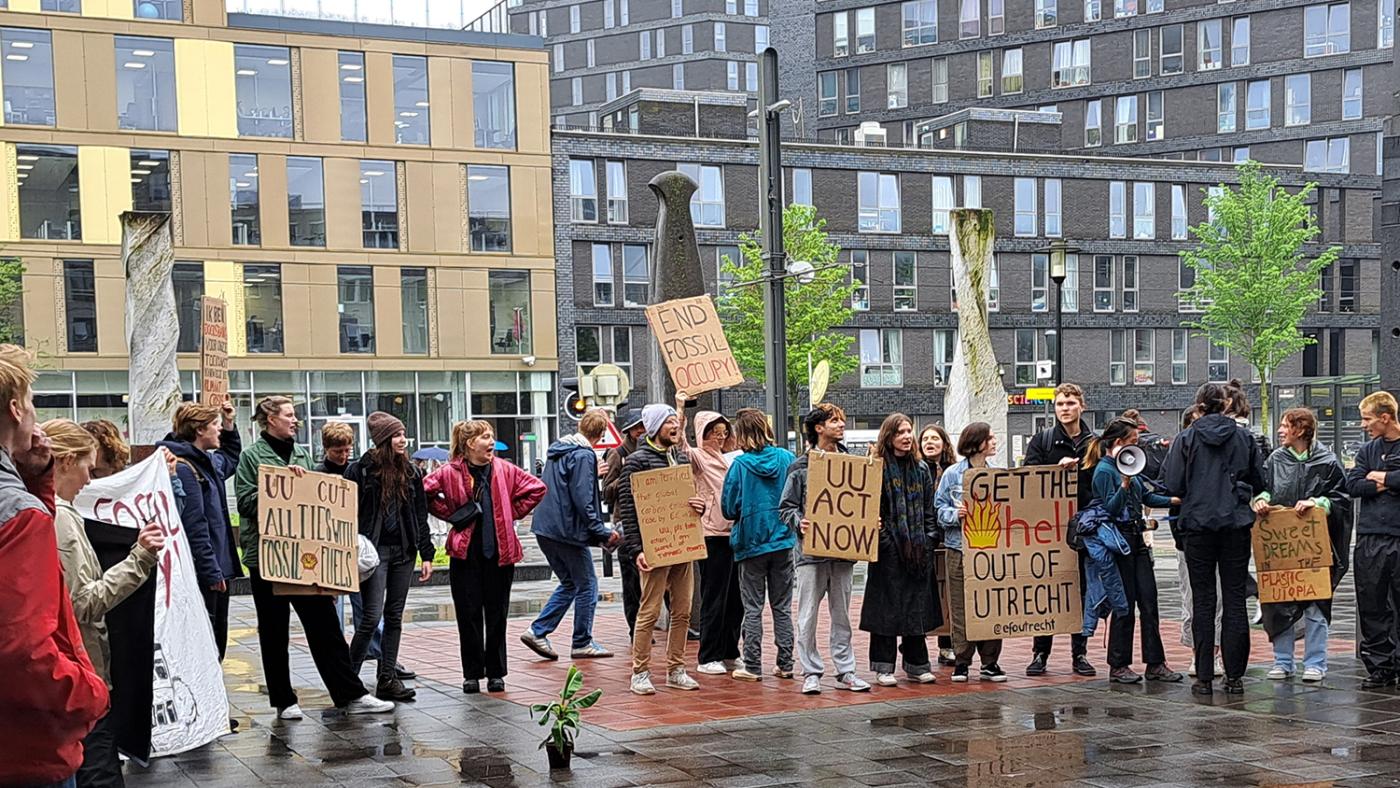Following occupation by climate activists
UU details ties to the fossil fuel industry on its website

On May 31, Utrecht University published a page on its website that gives insight into its research collaborations with the fossil fuel industry and how much money is involved in these partnerships. The university has used the following definition of fossil fuel companies: "companies that produce oil and other fossil fuels themselves and chemical companies with a strong affinity for the production of these fossil fuels." Partnerships with chemical and energy companies in general have not been taken into account.
A spokesperson for the Executive Board underscores that the overview on the page is only a snapshot. The site is set to be updated every six months. Right now, no companies are named because the university is still holding conversations with them about the publication of data. However, it is well known that UU collaborates with Shell, BP International, Exxon Mobil and the Dutch Petroleum Society (Dutch acronym: NAM).
According to the page, UU receives a total of 5.7 million euros from the fossil fuel industry, which corresponds to 0.41 percent of the university's total budget for research (1.408.365.467 euros).
The site was launched to meet one of the demands made by End Fossil: Occupy Utrecht (EFO Utrecht), which called on the university to be transparent about its partnerships with the fossil fuel industry.
Severing ties
The activists occupied the Minnaert building between May 8 and May 10 with the goal to push the university to sever its ties with the fossil fuel industry by 2025. The occupiers presented UU with a list of 23 demands that had to be met before May 31. The demands were divided into three categories: transparency, severing ties with the industry, and making the university accessible.
On May 31, the Executive Board sent an e-mail to EFO Utrecht with an attachment in which the board's four members react to the demands, point by point. The document says that the university will not be speeding up its steps to arrive at a policy framework that will set preconditions for partnerships with the fossil fuel industry. Instead, the university will continue on its path of consulting with protest groups, students and employees, as it did in the two "deep democracy" meetings held this year. The board adds that a proposal will be ready by August 1, which will be discussed with the University Council.
UU's Executive Board also stresses that companies from the fossil fuel industry have not taken part in the university's Career Days for four years. However, they refrained from saying anything about whether they could participate again in the future. The new policy should also give study associations tools to examine their own collaborations — something that will come in handy for the Earth Sciences association, which does have ties with this sort of company. Another thing that isn't clear is whether the new policy will forbid future partnerships with the fossil fuel industry or not.
Mandatory course and state of emergency
When the activists were still occupying the building, UU promised to use the term "climate emergency" in its future communications. Up until that point, UU was refraining from doing that because the institution itself was not in a state of emergency. The Executive Board recognised that this was a literal interpretation of the word. Now, UU's website has a special page on the climate crisis, which lists all of its research related to climate change.
Another demand made by the activists was the creation of a course on sustainability and climate change that would be mandatory for all students, regardless of their field. The Executive Board says that forcing all students to follow a certain course goes against the university's philosophy, not to mention it would set a precedent: the university would have to set up other mandatory courses on topics considered important, such as preventing inappropriate and abusive behaviours. Besides, it is already possible for all students to take courses on sustainability. Last year, for example, the Faculty of Science came up with a handy course planner.
Accessibility
About the demands for a more inclusive curriculum, a good complaints procedure for inappropriate and abusive behaviours, and the reduction of temporary contracts, UU simply pointed the activists towards everything the university already does or has done in those areas.
There is news about sustainable catering, however: by the end of the year, a quarter of UU's coffee machines are going to offer oat milk instead of cow milk, thus meeting a demand made earlier this year by the Vegan Student Association.
The activists also made a number of social requests, such as cancelling student debt, giving a free public transport card to international students as well, and providing enough student housing. These are demands that are outside UU's competence, so there is nothing the university can do, the board clarifies.
EFO responds
End Fossil: Occupy is disappointed in the university because of "the lack of actual steps and actions." The movement is now formulating a broader reply.